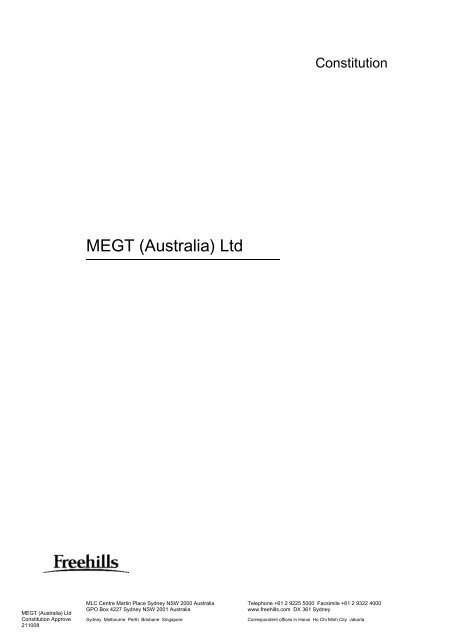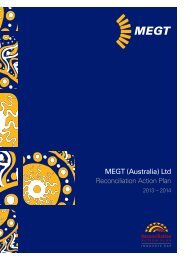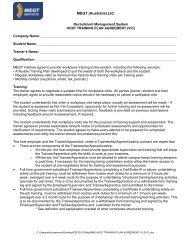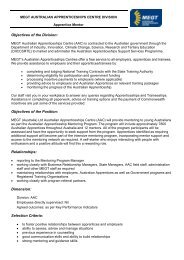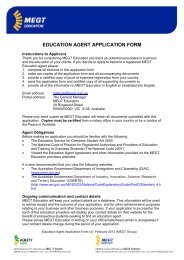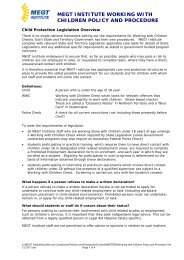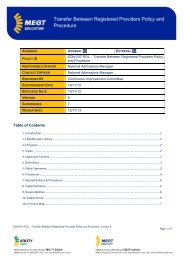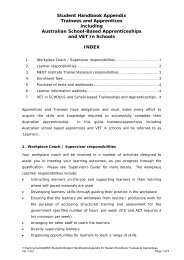MEGT (Australia) Limited constitution AL
MEGT (Australia) Limited constitution AL
MEGT (Australia) Limited constitution AL
- No tags were found...
You also want an ePaper? Increase the reach of your titles
YUMPU automatically turns print PDFs into web optimized ePapers that Google loves.
Contents10 Indemnity and insurance 1610.1 Persons to whom the indemnity and insurance apply .............................................1610.2 Indemnity .................................................................................................................1610.3 Insurance .................................................................................................................1610.4 Savings ....................................................................................................................1611 Auditor 1612 Notices 1612.1 Notices by the company to members ......................................................................1612.2 Notices by the company to directors........................................................................1712.3 Notices by member or directors to the company .....................................................1712.4 Time of service.........................................................................................................1712.5 Other communications and documents ...................................................................1812.6 Notices in writing......................................................................................................1813 Definitions and interpretation 1813.1 Definitions ................................................................................................................1813.2 Interpretation............................................................................................................1813.3 Headings..................................................................................................................1914 Application of the Act 1914.1 What parts of the Act apply......................................................................................1914.2 Replaceable rules displaced....................................................................................192.005153127.6 Approved 21/10/08 Constitution Contents 2
Constitution<strong>MEGT</strong> (<strong>Australia</strong>) Ltd ABN 85 006 266 280A company limited by guarantee1 Company’s purposesThe principle object for which the Company is established is to be a charitable institutionin <strong>Australia</strong> by advancing education, employment and training needs of <strong>Australia</strong>nsthrough group training, employment services, <strong>Australia</strong>n apprenticeships supportservices, educational and training services and such other charitable purposes that arebeneficial to the community.2 Not for profit status2.1 Application of the company’s income and property(a)(b)(c)The company’s income and property must be applied solely towards promotingthe company’s purposes.No part of the income or property may be paid, transferred or distributed,directly or indirectly, by way of dividend, bonus, or other profit distribution, toany of the members or directors.This rule 2 does not prohibit indemnification of, or payment of premiums oncontracts of insurance for, any director to the extent permitted by law and this<strong>constitution</strong>.2.2 Payments to directorsAll payments to directors must be approved by the directors including, but not limited to:(a)(b)(c)directors fees;out-of-pocket expenses incurred by a director in performing a duty as a directorof the company; ora service rendered to the company by a director in a professional or technicalcapacity or as an employee, other than in the capacity as a director of thecompany, where:(1) the provision of the service has the prior approval of the directors; and(2) the amount payable is not more than an amount which commerciallywould be reasonable payment for the service.2.005153127.6 Approved 21/10/08 Constitution page 3
3 Membership3 Membership3.1 Application(a)(b)(c)(d)The members are the directors and any other persons the directors admit tomembership.Every applicant for membership of the company (except the directors) mustapply in the form and manner decided by the directors.The directors may decide to create eligibility criteria and categories ofmembership with the same or differing rights or privileges.After the receipt of an application for membership made in accordance with this<strong>constitution</strong>, the directors (or a delegate approved by the directors) mustconsider the application and decide whether to admit or reject the admission ofthe applicant. The directors need not give any reason for rejecting anapplication.4 When membership ceases4.1 Death, resignation and other eventsA person immediately ceases to be a member if the person:(a) dies;(b) resigns as a member by giving written notice to the company;(c) ceases to be a director;(d) becomes of unsound mind or a person who is, or whose estate is, liable to bedealt with in any way under a law relating to mental health;(e)(f)(g)4.2 Expulsionbecomes bankrupt or insolvent or makes any arrangement or composition withhis or her creditors;is expelled under rule 4.2; orbecomes, if the directors so decide in their absolute discretion, an untraceablemember because the person has ceased to reside at, attend or otherwisecommunicate with his or her Registered Address.(a)(b)The directors may by resolution expel a member who is not a director, from thecompany if, in their absolute discretion, they decide it is not in the interests ofthe company for the person to remain a member.If the directors intend to consider a resolution under rule 4.2(a), at least oneweek before the meeting at which the resolution is to be considered, they mustgive the member written notice:(1) stating the date, place and time of the meeting;(2) setting out the intended resolution and the grounds on which it isbased; and(3) informing the member that he or she may attend the meeting and maygive an oral or written explanation or submission before the resolutionis put to the vote.<strong>MEGT</strong> (<strong>Australia</strong>) Ltd Constitution Approve2.005153127.6 211008 Constitution page 4
5 Liability of member5 Liability of memberThe liability of the members is limited to the amount of the guarantee given in rule 6.6 Guarantee by memberEvery member undertakes to contribute an amount not more than $100 to the property ofthe company if it is wound up while the person is a member or within one year after theperson ceases to be a member, for:(a) payment of the company’s debts and liabilities contracted before the time he orshe ceased to be a member; and(b) the costs, charges and expenses of winding up.7 Winding up(a)(b)If, on the winding up or dissolution of the company, any property remains aftersatisfaction of all its debts and liabilities, this property must only be given ortransferred to a fund, authority or institution:(1) that is charitable at law; and(2) whose <strong>constitution</strong> prohibits distributions or payments to its membersand directors (if any) to an extent at least as great as is outlined inrule 2.The identity of the fund, authority or institution referred to in rule 7(a) must bedecided by the directors, or if the directors do not wish to decide or do notdecide, it must be decided by the members by ordinary resolution at or beforethe time of winding up or dissolution of the company and, if the members cannotor do not decide, by the Supreme Court of the state or territory in which thecompany is registered.8 General meetings8.1 Calling general meetings(a)(b)A general meeting may only be called:(1) by a directors’ resolution; or(2) in accordance with a members’ requisition under the Act, or(3) as otherwise provided in the Act.The directors may change the venue for, postpone or cancel a general meeting,provided that if the general meeting was not called by a directors’ resolution orwas called in accordance with a members’ requisition under the Act, then it maynot be postponed or cancelled without the prior written consent of the personswho called or requisitioned the meeting.<strong>MEGT</strong> (<strong>Australia</strong>) Ltd Constitution Approve2.005153127.6 211008 Constitution page 5
8 General meetings8.2 Notice of general meetings(a)(b)(c)(d)(e)Notice of every general meeting must be given in any manner authorised byrule 12 to each person who is at the date of the notice:(1) a member;(2) a director; or(3) the Auditor.A notice of a general meeting must:(1) specify the date, time and place of the meeting;(2) except as provided by the Act, state the general nature of thebusiness to be transacted at the meeting; and(3) specify a place, fax number or electronic address for the receipt ofproxies.A person may waive notice of a general meeting by written notice to thecompany.The non-receipt of notice of a general meeting or proxy form by, or a failure togive notice of a general meeting or a proxy form to, any person entitled toreceive notice of a general meeting does not invalidate any thing done orresolution passed at the general meeting if:(1) the non-receipt or failure occurred by accident or error; or(2) before or after the meeting, the person has notified or notifies thecompany of the person’s agreement to that thing or resolution.A person’s attendance at a general meeting waives any objection that personmay have to:(1) a failure to give notice, or the giving of a defective notice, of themeeting unless, at the beginning of the meeting, the person objects tothe holding of the meeting; and(2) the consideration of a particular matter at the meeting which is notwithin the business referred to in the notice of the meeting, unless theperson objects to considering the matter when it is presented.8.3 Quorum at general meetings(a)(b)(c)(d)No business may be transacted at a general meeting, except the election of achairperson and the adjournment of the meeting, unless a quorum of membersis present when the meeting proceeds to business.A quorum consists of 3 members entitled to vote and present at the meeting, oras otherwise determined by the members from time to time.If a quorum is not present within 30 minutes after the time appointed for ageneral meeting:(1) where the meeting was convened on the requisition of members, themeeting must be dissolved; or(2) in any other case the meeting stands adjourned to the day, and at thetime and place, that the directors decide or, if the directors do notmake a decision, to the same day in the next week at the same timeand place.If at the adjourned meeting under rule 8.3(c)(2), a quorum is not present within30 minutes after the time appointed for the meeting, the meeting must bedissolved.<strong>MEGT</strong> (<strong>Australia</strong>) Ltd Constitution Approve2.005153127.6 211008 Constitution page 6
8 General meetings8.4 General meetings by technology(a)(b)(c)(d)The contemporaneous linking together by telephone or other electronic meansof a sufficient number of the members in person, to constitute a quorumconstitutes a meeting of the members, provided each member has a reasonableopportunity to participate at the meeting.All the provisions in this <strong>constitution</strong> relating to meetings of the members apply,so far as they can and with any necessary changes, to meetings of themembers by telephone or other electronic means.A member who takes part in a meeting by telephone or other electronic meansis taken to be present in person at the meeting.A meeting by telephone or other electronic means is taken as held at the placedecided by the chairperson of the meeting, as long as at least one of themembers involved was at that place for the duration of the meeting.8.5 Chairperson of general meetings(a)(b)(c)The chairperson of directors must preside as chairperson at a general meetingif present within 15 minutes after the time appointed for the meeting and willingto act.If there is no chairperson of directors or both the conditions in rule 8.5(a) havenot been met, the members present must elect another chairperson of themeeting.A chairperson elected under rule 8.5(b) must be:(1) another director who is present and willing to act; or(2) if no other director present at the meeting is willing to act, a memberwho is present and willing to act.8.6 Conducting and adjourning general meetings(a)(b)(c)(d)(e)A question arising at a general meeting relating to the order of business,procedure or conduct of the meeting must be referred to the chairperson of themeeting, whose decision is final.The chairperson of a general meeting may, and must if so directed by themeeting, adjourn the meeting from time to time and from place to place, but nobusiness may be transacted at any adjourned meeting except the business leftunfinished at the meeting from which the adjournment took place.Where a meeting is adjourned for 30 days or more, notice of the adjournedmeeting must be given as for an original meeting.Except as provided by rule 8.6(c), it is not necessary to give any notice of anadjournment or of the business to be transacted at an adjourned meeting.Where a meeting is adjourned, the directors may change the venue of, orpostpone or cancel, the adjourned meeting, unless the meeting was called andarranged to be held by the members or the court under the Act. If a meeting iscalled and arranged to be held under section 249D of the Act, the directors maynot postpone it beyond the date by which section 249D requires it to be heldand may not cancel it without the consent of the requisitioning member.8.7 Decisions at general meetings(a)Except where by law a resolution requires a special majority, questions arisingat a general meeting must be decided by a majority of votes cast by the<strong>MEGT</strong> (<strong>Australia</strong>) Ltd Constitution Approve2.005153127.6 211008 Constitution page 7
8 General meetings(b)(c)(d)(e)(f)(g)(h)(i)members present at the meeting. Such a decision is for all purposes a decisionof the members.Where the votes on a proposed resolution are equal:(1) the chairperson of the meeting does not have a second or castingvote; and(2) the proposed resolution is taken as lost.A resolution put to the vote of a general meeting must be decided on a show ofhands unless, before the vote is taken or before or immediately after thedeclaration of the result of the show of hands, a poll is demanded by:(1) the chairperson of the meeting;(2) at least 2 members present and with the right to vote on theresolution; or(3) a member or members present at the meeting and representing atleast 5% of the total voting rights of all the members entitled to vote onthe resolution on a poll.A demand for a poll does not prevent a general meeting continuing for thetransaction of any business except the question on which the poll has beendemanded.Unless a poll is duly demanded, a declaration by the chairperson of a generalmeeting that a resolution has on a show of hands been carried or carriedunanimously, or carried by a particular majority, or lost, and an entry to thateffect in the book containing the minutes of the proceedings of the company, isconclusive evidence of the fact without proof of the number or proportion of thevotes recorded in favour of or against the resolution.If a poll is duly demanded at a general meeting, it must be taken in suchmanner, and either at once or after an interval or adjournment or otherwise, asthe chairperson of the meeting directs. The result of the poll is the resolution ofthe meeting at which the poll was demanded.A poll demanded at a general meeting on the election of a chairperson of themeeting or on a question of adjournment must be taken immediately.The demand for a poll may be withdrawn.If the company has only one member, the company may pass a resolution bythe member recording it and signing the record.8.8 Voting rights(a)(b)(c)(d)Subject to this <strong>constitution</strong> and to any rights or restrictions attached to any classof membership, at a general meeting every member present has one vote.A proxy, attorney or representative is entitled to a separate vote for eachmember the person represents, in addition to any vote the person may have asa member in his or her own right.An objection to the qualification of a person to vote at a general meeting mustbe:(1) raised before or at the meeting at which the vote objected to is givenor tendered; and(2) referred to the chairperson of the meeting, whose decision is final.A vote not disallowed by the chairperson of a meeting under rule 8.8(c) is validfor all purposes.<strong>MEGT</strong> (<strong>Australia</strong>) Ltd Constitution Approve2.005153127.6 211008 Constitution page 8
8 General meetings8.9 Representation at general meetings(a)(b)(c)Subject to this <strong>constitution</strong>, each member entitled to vote at a meeting ofmembers may vote:(1) in person or, where a member is a body corporate, by itsrepresentatives;(2) by one proxy; or(3) by one attorney.A proxy, attorney or representative may, but need not, be a member of thecompany.A proxy, attorney or representative may be appointed for all general meetings,or for any number of general meetings, or for a particular general meeting.8.10 Authority of a proxy, attorney or representative(a)(b)(c)(d)(e)Unless otherwise provided in the instrument, an instrument appointing a proxy,attorney or representative is to be taken to confer authority:(1) to agree to a meeting being convened by shorter notice than isrequired by the Act or by this <strong>constitution</strong>; and(2) to agree to a resolution being proposed and passed as a specialresolution at a meeting of which less than the period of notice requiredby the Act has been given.Even though the instrument (appointing a proxy, attorney or representative)may refer to specific resolutions and may direct the proxy, attorney orrepresentative how to vote on those resolutions, unless otherwise provided, it istaken to confer authority:(1) to vote on any amendment moved to the proposed resolutions and onany motion that the proposed resolutions not be put or any similarmotion;(2) to vote on any procedural motion, including any motion to elect thechairperson, to vacate the chair or to adjourn the meeting; and(3) to act generally at the meeting.An instrument appointing a proxy, attorney or representative may direct themanner in which the proxy, attorney or representative is to vote in respect of aparticular resolution and, where an instrument so provides, the proxy, attorneyor representative is not entitled to vote on the proposed resolution except asdirected in the instrument.Subject to rule 8.10(e), an instrument appointing a proxy, attorney orrepresentative need not be in any particular form as long as it is in writing,legally valid and signed by or on behalf of the appointer or the appointer'sattorney.A proxy, attorney or representative may not vote at a general meeting oradjourned meeting or on a poll unless the instrument appointing the proxy,attorney or representative, and the authority under which the instrument issigned or a certified copy of the authority, are:(1) received at the registered office of the company, a fax number at thecompany's registered office or at another place, fax number orelectronic address specified for that purpose in the notice conveningthe meeting before the time specified in the notice;<strong>MEGT</strong> (<strong>Australia</strong>) Ltd Constitution Approve2.005153127.6 211008 Constitution page 9
9 Directors(f)(g)(h)(2) in the case of a meeting or an adjourned meeting, tabled at themeeting or adjourned meeting at which the person named in theinstrument proposes to vote; or(3) in the case of a poll, produced when the poll is taken.The directors may waive all or any of the requirements of rules 8.10(d) and8.10(e) and in particular may, on the production of such other evidence as thedirectors require to prove the validity of the appointment or a proxy, attorney orrepresentative, accept:(1) an oral appointment of a proxy, attorney or representative;(2) an appointment of a proxy, attorney or representative which is notsigned in the manner required by rule 8.10(d); and(3) the deposit, tabling or production of a copy (including a copy sent byfax) of an instrument appointing a proxy, attorney or representative orof the power of attorney or other authority under which the instrumentis signed.A vote given in accordance with the terms of an instrument appointing a proxy,attorney or representative is valid despite the revocation of the instrument or ofthe authority under which the instrument was executed, if no written notice ofthe revocation has been received by the company by the time and at one of theplaces at which the instrument appointing the proxy, attorney or representativeis required to be deposited, tabled or produced under rule 8.10(e).The appointment of a proxy or attorney is not revoked by the appointerattending and taking part in the general meeting but, if the appointer votes on aresolution, the person acting as proxy or attorney for the appointer is not entitledto vote, and must not vote, as the appointer’s proxy or attorney on theresolution.9 Directors9.1 Appointing and removing directors(a)(b)The minimum number of directors is 3. The maximum number of directors is tobe fixed by the directors, but may not be more than 12 unless the company ingeneral meeting resolves otherwise. The directors must not determine amaximum which is less than the number of directors in office at the time thedetermination takes effect.The directors may appoint any individual as a director, either to fill a casualvacancy or as an addition to the existing directors, provided:(1) the number of directors does not exceed the maximum number fixedunder rule 9.1(a) ; and(2) before appointing the director, the proposed director signs a consentto act as a director.9.2 Retirement of directors by rotation(a)A director appointed by the directors under rule 9.1(b) who is not an executivedirector, holds office only until the conclusion of the next annual generalmeeting following his or her appointment.<strong>MEGT</strong> (<strong>Australia</strong>) Ltd Constitution Approve2.005153127.6 211008 Constitution page 10
9 Directors(b)(c)(d)(e)(f)(g)At every annual general meeting if the number of directors, (after excluding anyexecutive directors and any directors appointed by the directors underrule 9.1(b) and standing for election),(1) is 5 or less, then 2 of the remaining directors must retire from office; or(2) if the number is more than 5, one third of those directors (to thenearest whole number) must retire from office.No director (excluding any executive director) may hold office withoutre-election beyond the third annual general meeting following the meeting atwhich the director was last elected or re-elected.The directors to retire under rule 9.2(b) are those directors who wish to retireand not offer themselves for re-election, those directors required to retire underrule 9.2(c) and, so far as is necessary to obtain the number required, those whohave been longest in office since their last election or appointment. As betweendirectors who were last elected or appointed on the same day, those to retiremust, unless they can agree among themselves, be decided by lot.The directors to retire under rule 9.2(b) (both as to number and identity) isdecided having regard to the composition of the board of directors at the date ofthe notice calling the annual general meeting. A director is not required to retireand is not relieved from retiring because of a change in the number or identity ofthe directors after the date of the notice but before the meeting closes.A director retiring from office is eligible for re-election subject to a maximumterm of 9 years, unless the maximum term is varied for a particular director bythe directors.The retirement of a director from office and the re-election of the director or theelection of another person to that office (as the case may be) takes effect at theconclusion of the meeting at which the retirement and re-election or electionoccur.9.3 Vacation of officeThe office of a director becomes vacant:(a) in the circumstances prescribed by the Act;(b) if the director becomes of unsound mind or a person who is, or whose estate is,liable to be dealt with in any way under the law relating to mental health;(c) if the director is removed from office by resolution of the members inaccordance with the Act;(d) if the director fails to attend meetings of the directors for at least 3 consecutivemeetings or at least 4 meetings over a period of 12 months without leave ofabsence; or(e) if the director resigns by written notice to the company.9.4 Directors may contract with the company and hold other offices(a)(b)The directors may make regulations requiring the disclosure of interests that adirector, and any person considered by the directors as related to or associatedwith the director, may have in any matter concerning the company or a relatedbody corporate. Any regulations made under this <strong>constitution</strong> bind all directorsbut no act, transaction, agreement, instrument, resolution or other thing with athird party is invalid or voidable only because a director fails to comply with theregulations.Unless the Act permits, a director who has a material personal interest in amatter that is being considered at a directors’ meeting must not:<strong>MEGT</strong> (<strong>Australia</strong>) Ltd Constitution Approve2.005153127.6 211008 Constitution page 11
9 Directors(c)(d)(e)(f)(g)(h)(1) be present while the matter is being considered at the meeting; or(2) vote on the matter.A director is not disqualified from contracting or entering into an arrangementwith the company as vendor, purchaser or in another capacity, merely becausethe director holds office as a director or because of the fiduciary obligationsarising from that office, provided that such contract or arrangement is approvedby the directors of the company.A contract or arrangement entered into by or on behalf of the company in whicha director is in any way interested is not invalid or voidable merely because thedirector holds office as a director or because of the fiduciary obligations arisingfrom that office.A director who is interested in any arrangement involving the company is notliable to account to the company for any profit realised under the arrangementmerely because the director holds office as a director or because of thefiduciary obligations arising from that office, provided that the director complieswith the disclosure requirements applicable to the director under any regulationsadopted by the directors, and under the Act regarding that interest.A director may hold any other office or position (except Auditor) in the companyor any related body corporate in conjunction with his or her directorship andmay be appointed to that office or position on terms (including remuneration andtenure) the directors decide.A director may be or become a director or other officer of, or interested in, anyrelated body corporate or any other body corporate associated with thecompany, and, with the consent of the directors of the company, need notaccount to the company for any remuneration or other benefits the directorreceives as a director or officer of, or from having an interest in, that bodycorporate.The directors may exercise the voting rights conferred by shares in any bodycorporate held or owned by the company in the manner in all respects that theythink fit.9.5 Powers and duties of directors(a)(b)(c)The directors are responsible for managing the company’s affairs and carryingout the objects of the company. The directors may exercise to the exclusion ofthe company in general meeting all the company’s powers which are notrequired, by the Act or by this <strong>constitution</strong>, to be exercised by the company ingeneral meeting.The directors may decide how cheques, promissory notes, bankers drafts, billsof exchange or other negotiable instruments must be signed, drawn, accepted,endorsed or otherwise executed (as applicable) by or on behalf of the company.The directors may:(1) appoint or employ an officer, agent or attorney of the company withthe powers, discretions and duties vested in or exercisable by thedirectors, on the terms the directors decide;(2) authorise an officer, agent or attorney to delegate all or any of thepowers, discretions and duties vested in the officer, agent or attorney;and(3) subject to any contract between the company and the relevant officer,agent or attorney, remove or dismiss any officer, agent or attorney atany time, with or without cause.<strong>MEGT</strong> (<strong>Australia</strong>) Ltd Constitution Approve2.005153127.6 211008 Constitution page 12
9 Directors(d)A power of attorney may contain any provisions for the protection andconvenience of the attorney or persons dealing with the attorney that thedirectors think fit.9.6 Proceedings of directors(a)(b)(c)(d)(e)The directors may meet together and adjourn and otherwise regulate theirmeetings as they think fit.The contemporaneous linking together by telephone or other electronic meansof a sufficient number of the directors to constitute a quorum constitutes ameeting of the directors. All the provisions in this <strong>constitution</strong> relating tomeetings of the directors apply, so far as they can and with any necessarychanges, to meetings of the directors by telephone or other electronic means.A director who takes part in a meeting by telephone or other electronic means istaken to be present in person at the meeting.A meeting by telephone or other electronic means is taken as held at the placedecided by the chairperson of the meeting, as long as at least one of thedirectors involved was at that place for the duration of the meeting.If, before or during the meeting, any technical difficulty occurs as a result ofwhich one or more directors cease to participate, the chairperson may adjournthe meeting until the difficulty is remedied or may, where a quorum of directorsremains present, continue with the meeting.9.7 Convening meetings of directors(a)(b)A director may convene a meeting of the directors whenever he or she thinks fit.A secretary must, on the requisition of a director, convene a meeting of thedirectors.9.8 Notice of meetings of directors(a)(b)(c)(d)Subject to this <strong>constitution</strong>, notice of a meeting of directors must be given toeach person who is at the time of giving the notice a director, except a directoron leave of absence approved by the directors.A notice of a meeting of directors:(1) must specify the time and place of the meeting;(2) need not state the nature of the business to be transacted at themeeting;(3) must give reasonable notice of the meeting; and(4) may be given in person or by post, telephone, fax or other electronicmeans.A director may waive notice of a meeting of directors by notifying the companyto that effect in person or by post, telephone, fax or other electronic means.The non-receipt of notice of a meeting of directors by, or a failure to give noticeof a meeting of directors to, a director does not invalidate any thing done orresolution passed at the meeting if:(1) the non-receipt or failure occurred by accident or error;(2) the director has waived or waives notice of that meeting underrule 9.8(c) before or after the meeting;<strong>MEGT</strong> (<strong>Australia</strong>) Ltd Constitution Approve2.005153127.6 211008 Constitution page 13
9 Directors(e)(3) the director has notified or notifies the company of his or heragreement to that thing or resolution personally or by post, telephone,fax or other electronic means before or after the meeting; or(4) the director attended the meeting.Attendance by a person at a meeting of directors waives any objection whichthat person may have to a failure to give notice of the meeting.9.9 Quorum at meetings of directors(a)(b)(c)(d)No business may be transacted at a meeting of directors unless a quorum ofdirectors is present at the time the business is dealt with.A quorum consists of 3 directors present at the meeting, or as otherwisedetermined by the directors from time to time.If there is a vacancy in the office of a director then, subject to rule 9.9(d), theremaining directors may act.If the number of directors in office at any time is not sufficient to constitute aquorum, or is less than the minimum number of directors fixed under this<strong>constitution</strong>, the remaining directors must act as soon as possible to appointadditional directors, as required, and, until that has happened, may only act ifand to the extent that there is an emergency requiring them to act.9.10 Chairperson of directors(a)(b)(c)The directors may elect one of the directors as chairperson of directors and maydecide the period for which that director is to be the chairperson.The chairperson of directors must preside as chairperson at each meeting ofdirectors if present within 10 minutes after the time appointed for the meetingand willing to act.If there is no chairperson of directors or both the conditions in rule 9.10(b) havenot been met, the directors present must elect one of the directors aschairperson of the meeting.9.11 Decisions of directors(a)(b)(c)A meeting of directors at which a quorum is present may exercise all the powersand discretions vested in or exercisable by the directors under this <strong>constitution</strong>.Questions arising at a meeting of directors must be decided by a majority ofvotes cast by the directors present. Such a decision is for all purposes adecision of the directors.Where the votes on a proposed resolution are equal the chairperson of themeeting shall have a second or casting vote.9.12 Written resolutions of directors(a)A resolution is taken to have been passed by a meeting of directors if:(1) all of the directors (other than any director on leave of absenceapproved by the directors, any director who disqualifies himself orherself from considering the resolution in question and any directorwho would be prohibited by the Act from voting on the resolution inquestion) sign or consent to a written resolution; and<strong>MEGT</strong> (<strong>Australia</strong>) Ltd Constitution Approve2.005153127.6 211008 Constitution page 14
9 Directors(b)(2) the directors who sign or consent to the resolution would haveconstituted a quorum at a meeting of directors held to consider thatresolution.A director may consent to a resolution by:(1) signing the document containing the resolution (or a copy of thatdocument);(2) giving to the company at its registered office a written notice (includingby fax or other electronic means) addressed to the secretary or to thechairperson of directors signifying assent to the resolution and eithersetting out its terms or otherwise clearly identifying them; or(3) telephoning the secretary or the chairperson of directors andsignifying assent to the resolution and clearly identifying its terms.9.13 Minutes of meetings and minutes of resolutions(a)(b)(c)The directors must ensure minutes of proceedings and resolutions of generalmeetings and of meetings of directors (including committees of directors) arerecorded in books kept for the purpose, within one month after the relevantmeeting is held.The directors must ensure minutes of resolutions passed by directors (andcommittees of directors) without a meeting are recorded in books kept for thatpurpose within one month after the resolution is passed.The minutes of a meeting must be signed within a reasonable time by thechairperson of the meeting or the chairperson of the next meeting.9.14 Committees of directors(a)(b)(c)The directors may delegate any of their powers to one or more committeesconsisting of the number of directors they think fit.A committee to which any powers have been delegated must exercise thepowers delegated in accordance with any directions given by the directors.The provisions of this <strong>constitution</strong> that apply to meetings and resolutions ofdirectors apply, so far as they can and with any necessary changes, tomeetings and resolutions of a committee of directors.9.15 Delegation to individual directors(a)(b)The directors may delegate any of their powers to one director.A director to whom any powers have been delegated must exercise the powersdelegated in accordance with any directions given by the directors.9.16 Validity of actsAn act done by a person acting as a director, a meeting of directors, or a committee ofdirectors attended by a person acting as a director, is not invalidated merely because ofone of the following circumstances, if that circumstance was not known by the person, thedirectors or the committee (as applicable) when the act was done:(a)(b)(c)a defect in the appointment of the person as a director;the person being disqualified to be a director or having vacated office; orthe person not being entitled to vote.<strong>MEGT</strong> (<strong>Australia</strong>) Ltd Constitution Approve2.005153127.6 211008 Constitution page 15
10 Indemnity and insurance10 Indemnity and insurance10.1 Persons to whom the indemnity and insurance applyThe indemnity and insurance referred to in this rule 10 apply to Indemnified Officers.10.2 Indemnity(a)(b)The company must indemnify, on a full indemnity basis and to the full extentpermitted by law, each Indemnified Officer against all losses or liabilities(including costs and expenses) incurred by the person as an officer of thecompany.This indemnity:(1) is a continuing obligation and is enforceable by an Indemnified Officereven though that person has ceased to be an officer of the company;and(2) operates only to the extent that the loss or liability in question is notcovered by insurance.10.3 InsuranceThe company may, to the extent permitted by law, purchase and maintain insurance; orpay or agree to pay a premium for insurance, for any Indemnified Officer against anyliability incurred by the person as an officer of the company where the directors considerit appropriate to do so.10.4 SavingsNothing in this rule 10:(a)(b)affects any other right or remedy that an Indemnified Officer may have inrespect of any loss or liability referred to in this indemnity or insurance; orlimits the capacity of the company to indemnify or provide or pay for insurancefor any person to whom this rule 10 does not apply.11 AuditorThe company must appoint a properly qualified Auditor whose duties will be regulated inaccordance with the Act.12 Notices12.1 Notices by the company to membersThe company may give notices, including a notice of general meeting to a member:(a) personally;(b) by sending it by post to the address for the member in the register of membersor the alternative address (if any) nominated by the member; or<strong>MEGT</strong> (<strong>Australia</strong>) Ltd Constitution Approve2.005153127.6 211008 Constitution page 16
12 Notices(c)by sending it to the fax number or electronic address (if any) nominated by themember.12.2 Notices by the company to directorsSubject to this <strong>constitution</strong>, a notice may be given by the company to any director by:(a)(b)(c)serving it personally at the director’s usual residential or business address;sending it by post in a prepaid envelope to the director’s usual residential orbusiness address; orby electronic means or fax to such electronic address or fax number, as thedirector has supplied to the company for giving notices.12.3 Notices by member or directors to the companySubject to this <strong>constitution</strong>, a notice may be given by a member or director to thecompany by:(a) serving it on the company at the registered office of the company;(b) sending it by post in a prepaid envelope to the registered office of the company;or(c) by fax or electronic means to the principal fax number or the principal electronicaddress of the company at its registered office.12.4 Time of service(a)(b)(c)(d)(e)Where a notice is sent by post, service of the notice is to be taken to be effectedif a prepaid envelope containing the notice is properly addressed and placed inthe post and to have been effected:(1) in the case of a notice of a general meeting, on the Business Day afterthe date of its posting; or(2) in any other case, at the time at which the letter would be delivered inthe ordinary course of post.Where a notice is sent by fax, service of the notice is to be taken to be effectedif the correct fax number appears on the fax report generated by the sender’sfax machine and to have been effected at the time the fax is sent.Where a notice is sent by electronic means by electronic messaging systemthat contains a delivery verification function, service of the notice is to be takento be effected on the generation by the electronic messaging system of adelivery verification notice or log entry, or other confirmation.Where notice is sent by electronic means by electronic mail or other electronicmessaging system (other than those referred to in rule 12.4(c)), service of thenotice is to be taken to be effected on the delivery to:(1) where the addressee is a natural person, the addressee’s electronicmail or electronic messaging system account; or(2) where the addressee is a corporation, the corporation’s computersystems.If service under rules 12.4 (a), 12.4(b), 12.4(c) and 12.4(d) is on a day which isnot a Business Day or is after 4.00pm (addressee’s time), the notice is regardedas having been received at 9.00am on the next following Business Day.<strong>MEGT</strong> (<strong>Australia</strong>) Ltd Constitution Approve2.005153127.6 211008 Constitution page 17
13 Definitions and interpretation12.5 Other communications and documentsRules 12.1 to 12.4 (inclusive) apply, so far as they can and with any necessary changes,to the service of any communication or document.12.6 Notices in writingA reference in this <strong>constitution</strong> to a written notice includes a notice given by fax orelectronic transmission or any other form of written communication.13 Definitions and interpretation13.1 DefinitionsThe meanings of the terms used in this <strong>constitution</strong> are set out below.TermMeaningActthe Corporations Act 2001 (Cth).Auditorthe auditor of the company.Business Daya day that is not a Saturday, Sunday or a public holiday or bank holiday in theplace concerned.Indemnified Officer 1 each person who is or has been an officer (within the meaning of section 9of the Corporations Act 2001) of the company; and2 any other officers or former officers of the company as the directors ineach case decide.Registered Addressa member’s address as notified to the company by the member and recordedin the company’s records.13.2 InterpretationIn this <strong>constitution</strong>:(a) references to notices include formal notices of meeting and all documents andother communications from the company to its member;(b)(c)a reference to any legislation or a provision of any legislation includes anyamendment to that legislation or provision, any consolidation or replacement ofthat legislation or provision and any subordinate legislation made under thatlegislation;a reference to a member present at a general meeting is a reference to amember present in person or by proxy, attorney or representative;<strong>MEGT</strong> (<strong>Australia</strong>) Ltd Constitution Approve2.005153127.6 211008 Constitution page 18
14 Application of the Act(d)(e)a reference to writing and written includes printing, lithography and other waysof representing or reproducing words in a visible form; andthe singular (including defined terms) includes the plural and the plural includesthe singular.13.3 HeadingsHeadings are used for convenience only and do not affect the interpretation of this<strong>constitution</strong>.14 Application of the Act14.1 What parts of the Act applyUnless the contrary intention appears:(a) an expression used in a rule that deals with a matter dealt with by a provision ofthe Act has the same meaning as in that provision; and(b)subject to rule 14.1(a), an expression in a rule that has a defined meaning forthe purposes of the Act has the same meaning as in the Act.14.2 Replaceable rules displaced(a)(b)The provisions of this <strong>constitution</strong> displace each provision of a section orsubsection of the Act that applies (or would apply but for this rule) to thecompany.The replaceable rules do not apply to the company except those which operateas mandatory rules for public companies under the Act.<strong>MEGT</strong> (<strong>Australia</strong>) Ltd Constitution Approve2.005153127.6 211008 Constitution page 19


